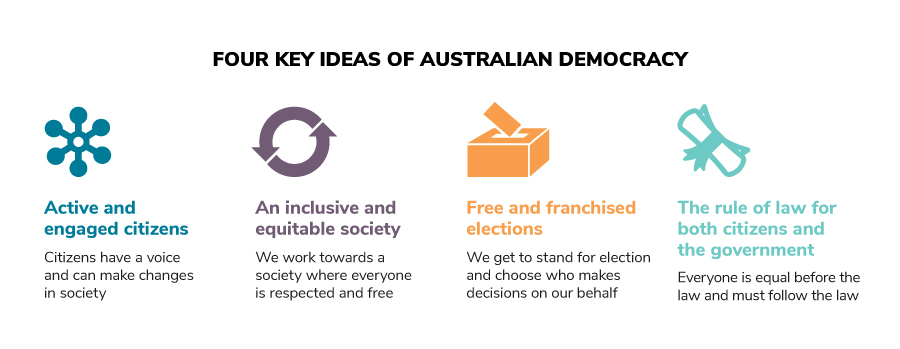Democracy
This fact sheet introduces the idea of democracy and explores the key ideas which support Australia’s democratic system of government.
What will I learn?
- Democracy means rule by the people.
- Australia is a democratic country.
- Australian democracy is supported by key features like freedom of speech, fair elections, inclusion, and the rule of law.
Curriculum alignment
Year 5 AC9HS5K06
Year 6 AC9HS6K06
Year 7 AC9HC7K01
Year 7 AC9HC7K02
Year 7 AC9HC7K03
Year 7 AC9HC7K05
Year 8 AC9HC8K01
Year 9 AC9HC9K05
Year 10 AC9HC10K01
Year 10 AC9HC10K05
What is democracy?
Democracy means rule by the people. The word comes from the ancient Greek words ‘demos’ (the people) and ‘kratos’ (to rule). A democratic country has a system of government where people have the power to participate in decision-making.
Each democracy is unique and works in different ways. In some, people help make decisions directly by voting on laws and policy proposals. This is called direct democracy. In others, like Australia, citizens choose representatives to make decisions on their behalf. This is known as representative democracy.
Australian democracy
Australian democracy is supported by 4 key features:
Democracy key ideas

Parliamentary Education Office (peo.gov.au)
Description
The 4 key ideas of Australian democracy are:
- Active and engaged citizens – Citizens have a voice and can make changes in society.
- An inclusive and equitable society – We work towards a society where everyone is respected and free.
- Free and franchised elections – We get to stand for election and choose who makes decision on our behalf.
- The rule of law for both citizens and the government – Everyone is equal before the law and must follow the law.
Copyright information
This work is licensed under a Creative Commons Attribution-NonCommercial-NoDerivs 3.0 Unported License.
You are free to share – to copy, distribute and transmit the work.
Attribution – you must attribute the work in the manner specified by the author or licensor (but not in any way that suggests that they endorse you or your use of the work).
Non-commercial – you may not use this work for commercial purposes.
No derivative works – you may not alter, transform, or build upon this work.
Waiver – any of the above conditions can be waived if you get permission from the copyright holder.
Active and engaged citizens
- People have a voice and can make changes in society.
- People can participate by getting involved in their community. This might be by joining a charity, a political party or a community group.
- Everyone can get involved in the work of Parliament through contacting members of parliament, the work of committees, protesting and petitioning.
An inclusive and equitable society
- People work towards a society where everyone is respected and free, where everyone is valued and supported to reach their full potential.
- People have freedom of speech, association, movement and belief.
- Our society supports the development and well-being of individuals and their right to make their own choices.
- Opposing ideas are tolerated and respected. People listen to different points of view in Parliament and society.
Free and franchised elections
- People can stand for elections and choose who makes decisions on their behalf.
- Voting is done in secret so people can make their choice without pressure or intimidation.
- Elections are run by an independent organisation – the Australian Electoral Commission.
The rule of law for both citizens and the government
- Everyone is equal before the law and must follow the law, including the people who make laws.
- Laws should be fair, clearly written and protect people's rights.
What are the benefits of democracy?
Some of the benefits of democracy are:
- there are ways to resolve different views and conflicts peacefully
- respect for human dignity
- people have freedom to act, speak and think freely (as long as it does not stop others doing the same)
- equality before the law
- safety and security in the community
- transparency, responsiveness and accountability in government
- ability to hold elected representatives accountable.
